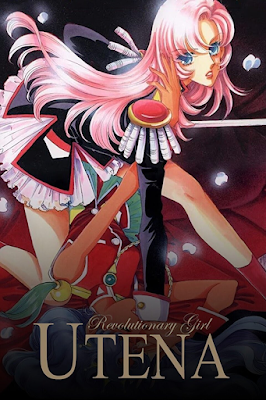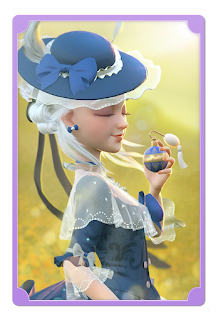How The Rose of Versailles Paved the Way for Revolutionary Girl Utena
I used to think that Revolutionary Girl Utena was the most innovative, unique, and original anime out there. After watching Princess Knight and now The Rose of Versailles, I realize that it drew inspiration from older anime sources. All three of these series feature women who don swords and take on the role of a man to protect the innocent. They each have their own queer-coded attributes that combine all the best things about noble heroes and damsels in distress. The Rose of Versailles, which came out in 1979, right in the middle of the 30-year gap between 1967's Princess Knight and 1997's Utena, stands apart from its surrogate cousins because it is set in a historical setting rather than a fairy tale world.
The Rose of Versailles takes place prior to and during the French Revolution. It spans the decades of Marie Antoinette's life from her engagement to King Louis XVI to her beheading at the guillotine. If you haven't already guessed, the show does not have a happy ending. Since the Queen Marie visual novel in Time Princess spans the same period of time, it gave me a point of context for the historical characters and events in the series. Marie is only a side character in Rose of Versailles, which focuses mainly on the life of a fictitious female soldier who serves in the Royal Guard and the French army. She was born to a father who was hoping for a boy after having many daughters. When another girl was born, he decided to name her Oscar and raise her like a boy. Despite her role as a soldier, Oscar identifies as a woman and struggles between her duty to her father and her romantic feelings toward her servant, André. Like Utena, Oscar is admired by all the women she encounters for her effortless ability to be as brave and strong as a man while maintaining a woman's grace and dignity.
What I love about these shows is the way they are able to depict women exhibiting masculine traits while remaining feminine in their actions and demeanor, something that Disney has been attempting and failing to do for the past decade. Both Oscar and Utena are determined to protect their respective princesses, but it comes from a place of female-driven compassion instead of a male-driven motivation such as power or sex. While fans like to debate about Utena's sexuality, she is attracted to men for the majority of the series, and her protective feelings toward Anthy are very innocent until the ending when they may have developed into something more, as interpreted in the 1999 movie adaptation. Utena also ends in tragedy, hinting that these characters may have been better off in circumstances that allowed them to be their true selves instead of selflessly taking on heroic roles for the sake of protecting others. Oscar is greatly admired by Marie Antoinette and Rosalie, an original character, but her heart belongs to André. She also some pent-up romantic feelings she has toward Marie's love interest, Fersen, which are realized during the one scene in the series where she dresses as a woman. Oscar only flees deeper into her male persona when she is attempting to escape these feminine romantic urges.I do have one nitpick about The Rose of Versailles as a result of playing the Queen Marie visual novel in Time Princess. One of the many historical characters featured in the anime was Gabrielle, the Duchess of Polignac, who happened to be a fan favorite from the visual novel. Gabrielle was a low-ranking noble who was down on her luck until Marie Antoinette befriended and welcomed her to court despite being strongly advised against it by her superiors. Gabrielle was ostracized by most nobles her status was not deserving of such a high-ranking position for the friendship she shared with Marie. This made Gabrielle an underdog. While most stories glorify underdogs for their reliability to the audience, The Rose of Versailles vilified Gabrielle by inventing some historical events that never took place and turning her into a despicable human being. I recently posted a rant about defamation of fictional characters who were based on real people, and this one made me just as angry. I couldn't believe they would take a character who was ostracized for most of her life and justify the hate by having her commit such heinous acts.
Princess Knight, The Rose of Versailles, and Revolutionary Girl Utena make up a trio of shows that span three decades and explore gender identity and fairy tale tropes in a way that Disney only wishes they could do with their princess line in the 2020s. They should watch these shows and take notes because Japan has gotten it right for over 50 years. I love how these series show us that it's possible for a woman to become the hero of her own story without needing to give up the things that make her uniquely female.














Comments
That is why we now see male characters who exhibit feminine qualities in a big way while the warrior princesses are made very similar to a man in the way of being and thinking and sometimes dressing (I have never been attracted to seeing Raya because of that... I'm just not attracted to her or the rival woman).
I don't think that trend will change in the West as long as that idea continues to be supported and the ridicule of the feminine is accepted. What's next? that many unhappy people are moving to non-western entertainment, anime, manga, chinese, korean or indonesian comics.
It's kind of surprising that femininity is so frowned upon in the west nowadays because when I was a little girl in the '90s, there would always be a "pink" aisle that I was drawn to when my parents brought me to the store that was covered in dolls, gowns, glitter, unicorns, and other knickknacks. Stores still have that to an extent, but it's mixed in with action figures and other things. Raya is a perfect stereotype of the modern female heroine, although it wasn't a bad movie per se, mainly thanks to Sisu, who was a fun character. The Disney Princess line is a bit disjointed now because it still tries to celebrate the older princesses but blends them with the newer ones by making them all look like friends to downplay the romantic aspects of the older films.
I've definitely been more focused on eastern entertainment as of late, but I think the west is trying to keep the old ideas alive with all their remakes of older movies so they can try to sell the aspects that people liked from the past but modernize them to satisfy newer audiences as well, which has led to pretty mediocre results.
The modern current does not want princesses to continue wearing glittery dresses nor do they need fairy godmothers, much less do they want romantic love to be part of the solution or for the girl to dream of falling in love.
The old stream we want cute dresses, fairies helping the kind girl, we like to see songs about hoping to fall in love one day and cute and sweet romance where true love shines. The modern current wants stories where the princess does not need to grow up because she is ready to be a queen, the old one we want to see how the girl grows and matures.
The result? princesses eager to be queens who put on the pretty dresses if necessary but seem to prefer more comfortable or battle clothes or practical dresses instead, who are uninterested in falling in love or averse to love and are able to do everything alone in such a way that if there is romance it will be with a passive boy, who does not get in the way and always lets her take the initiative whose love will not be something fundamental or decisive to solve the problem, being true love something that is embodied more in friendship, brotherly, maternal love, etc. These plots lack the ancient charm for fans of the princesses of yesteryear, they seem washed out and unexciting stories, on the other hand modern fans do not consider these stories daring enough because they still cling to the old in some parts.
In conclusion nobody is too happy.